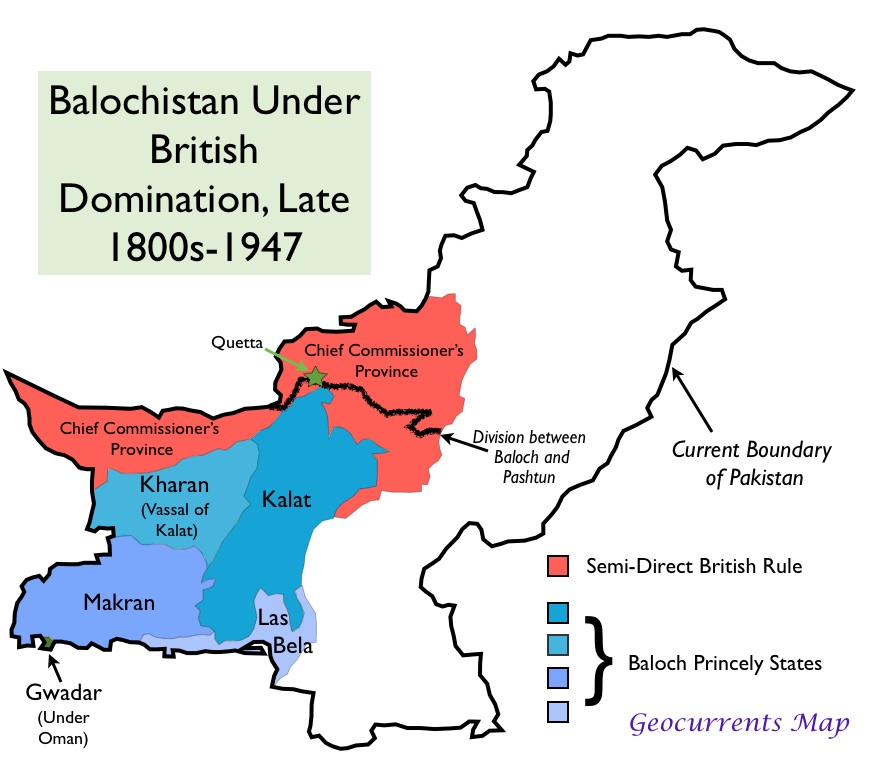
by Umar Moiz 18 April 2023
There should be no doubt that Balochistan is an integral part of Pakistan. Balochistan and Pakistan share the same identity, history, religion, and culture, as per the constitutional and legal framework.
It is absolutely pertinent to remember the way Balochistan became part of Pakistan. The current geographical boundary of Balochistan consists of four former princely states of Kalat, Lasbela, Kharan and Makran. Kalat became a part of Pakistan on 27th March 1948, with the willful accession of Pakistan, after Lasbela, Kharan, and Makran had already acceded with Pakistan. The relationship between Quaid-e-Azam and the Khan of Kalat, the leaders of Balochs was cordial and friendly, where Mr. Jinnah even served as his lawyer. The accession of Kalat with Pakistan was a bilateral affair, signed with the mutual understanding of the Khan of Kalat and the Government of Pakistan.
The purpose of the accession of Kalat with Pakistan was to safeguard and protect the Baloch identity and Brahui language. The government of Pakistan remains committed to the development and prosperity of Balochistan and encourages inclusive politics in Balochistan.
However, India has always harbored a vicious agenda against Pakistan and its integral parts, as their malice has been exposed time and time again. India’s long-standing attempts to interfere in Pakistan’s affairs and to undermine its territorial integrity remain worst kept secret in strategic community.
This Indian intention to destabilize Pakistan by supporting separatist movements has been going on since the independence. The first bullet was fired by Indian in 1948 when it announced Kalat’s accession to India, All India Radio sought to undermine Pakistan’s sovereignty and legitimize its own claims over the region.
India’s interference in Pakistan’s affairs has continued since then, with various attempts to support separatist movements in Balochistan, including funding and providing sanctuary to Baloch rebels. India has also provided material support to these rebels, including weapons and ammunition, in an effort to destabilize Pakistan.
These actions by India are not only a violation of Pakistan’s sovereignty but also a threat to regional stability. They have caused tensions between the two countries to escalate and have further complicated an already complex situation in the region. It is important for both countries to respect each other’s sovereignty and territorial integrity and to work towards peaceful resolution of any disputes through dialogue and diplomacy.
One must remember history; after the partition of the Indian Sub-Continent, three states, including Kharan, Lasbela, and Makran, wished to accede to West Pakistan, even without any decision of Kalat, as the Khan of Kalat desired subjugation of the other entities. The Khan of Kalat refused to accept their separate status. The Jam of Lasbela, Chief of Kharan, and Nawab Bai Khan of Makran once again appealed to Quaid to accept their accession during their meeting with him in March 1948, which was accepted by the state of Pakistan on 17th March 1948. Seeing the will of the majority to accede with Pakistan, Khan of Kalat, Ahmed Yar Khan willingly signed the Instrument of Accession on March 27th, 1948, which was placed before Jinnah on March 31st, 1948.
However, no resistance could be seen during the accession until the middle of July 1948, when the brother of the Khan returned from Afghanistan, and he started instigating people against this accession. Dissident elements often portray the accession of Balochistan to Pakistan wrongly, as they misguide the youth on Balochistan for their political interests. They use this misguiding as a bargaining tool to get undue benefits from the governments, which are mostly at the cost of the Baloch people’s prosperity and provincial development.
The province’s Shahi Jirga and the non-official members of the Quetta Municipality had agreed to join Pakistan on 29th June 1947. Kharan, Las Bela, and Mekran had applied to accede to Pakistan multiple times during that period. The Khan of Kalat, however, was pressurizing those states not to accede separately and join through him for his own interests. The news of All India Radio that “India rejected Khan’s request for accession to India” on the night of 27th March was fake. The Khan of Kalat, Mir Ahmad Yar Khan, rejected the news of joining India and declared accession to Pakistan.
The correct study of history shows that the people of Balochistan aspired to become a part of Pakistan, and the government of Pakistan remains committed to the development and prosperity of Balochistan. Moreover, the 18th Constitutional amendment has given more rights and resources to Balochistan.
About the Author
The author is a peace activist with masters in security studies from University of London, currently pursuing his PhD in Peace and Conflict Studies. Top of Form
